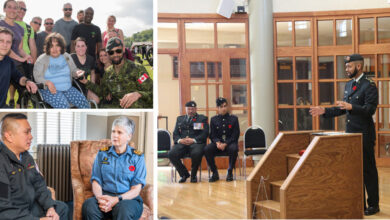Helpful Resources
Combatting Cyberbullying
Cyberbullying is the newest form of bullying parents need to be aware of. As fast as a computer keystroke lives can be altered forever, yet some bullies have no idea they did anything wrong.
Cyberbullying is when a child or teen becomes a target of actions by others using computers, cellphones or other devices, intended to embarrass, humiliate, harass, torment or threaten.
“Military children are often the new kids in school. They may be tempted to try and fit in by following the crowd, or partaking in peer pressure. This leaves them susceptible to either being cyberbullied or participating in cyberbullying,” said Sandra Garland, RSW prevention, support and intervention coordinator, St. John’s Military Family Resource Centre.
Most often, cyberbullying is sustained and repeated over a period of time, and it can damage a young person’s feelings, self-esteem, reputation and mental health. It can start as early as age eight or nine, but the majority of cyberbullying takes place in the teenage years, up to age 17.
Unlike face-to-face bullying, cyberbullying can be relentless, reaching a victim anywhere at anytime. Common signs a child may be experiencing cyberbullying include, they begin avoiding using their mobile device or computer. Or, conversely, they begin to spend much more time texting, gaming or using social networking sites.
There are signs to look for when a child or teen is being cyberbullied. They may appear upset, withdrawn or angry after receiving emails, instant messages or text messages, and may become secretive about online activities. The child may have trouble sleeping, or show less interest in eating.
The bullied child may be reluctant to leave the house, and begin avoiding social situations, become reluctant to go to school, or completely refuse.They may begin falling behind in school work or their grades go down.
A child may suddenly delete their social networking profiles and accounts, or block one or more numbers or email addresses from their online accounts or email.
“Parents need to watch for the signs of cyberbullying and open lines of communication with their kids. Talking about it gives our families a chance to find solutions together and lets the kids know someone is on their side. Talking to kids about what cyberbullying is can also prevent them from bullying another child. Sometimes they just don’t see how serious sending a mean photo or message can be,” said Garland.
Children need to be taught just because they are not the person initiating the bullying they can still be part of the problem. A passive bystander is someone who knows cyberbullying is taking place, and does nothing to stop it. Their silence gives the bully permission to keep going. An active bystander is someone who joins the bullying after someone else has initiated it.
Being safe online means using privacy settings on electronic devices, and thinking twice before posting anything online. It is important to keep personal online identifying details like address, date of birth, phone number, school, credit card numbers and passwords private.
It is also important to teach children to log out of online accounts when not using them especially on public computers. Saving passwords in form fields within web sites or web browsers, and staying logged on to a computer or cell phone can present an opportunity for someone to pretend they are them online.
“I encourage all Canadians to get informed and educate themselves about cyberbullying and the harmful effects it has on its victims. Everyone from government representatives, educators, non-governmental organizations, police, community groups, parents, and youth have an important part to play in stopping bullying and cyberbullying in Canada,” said The Honourable Steven Blaney, Canada’s Minister of Public Safety and Emergency Preparedness.
Parents need to advise children and teens to talk to friends about cyberbullying and to encourage them to support those who’ve been targeted. Plus tell cyberbullies to stop. If children see negative comments about someone online they need to refuse to participate and take a stand. Cyberbullying continues when others either play along, or do nothing.
For more information and resources on cyberbullying, please visit www.publicsafety.gc.ca.
If your military child is being bullied please visit www.familyforce.ca.
Get More! Receive six issues of Canadian Military Family Magazine in your mail box for only $17.95! Click here to subscribe NOW.









